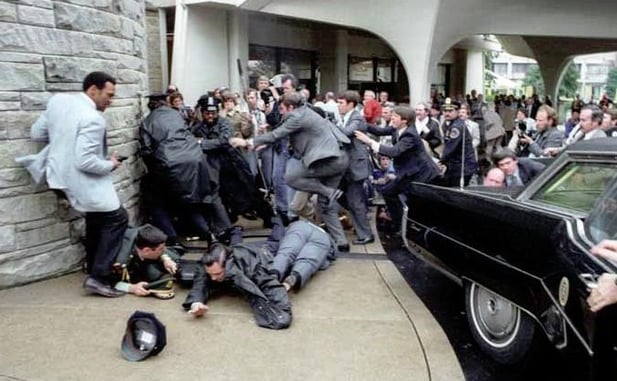By John Boch via TTAG
The Illinois State Police suffered a serious black eye as a result of the Aurora killing spree killing. The shooter committed a whole slew of felonies long before the ISP granted him a Firearms Owners ID card. Then, days later, they approved a firearm purchase.
Eventually, the ISP realized their mistake and revoked his FOID card, but nobody followed up on the revocation. The killer ignored the letter demanding that he surrender his freshly-cancelled FOID card and divest himself of his firearms.
Now, as of this morning, the Illinois State Police have announced new policies and procedures, to include using Illinois’ de facto gun registration system to help police confiscate firearms from gun owners with revoked FOID cards.
Springfield, IL – With the strong support of Governor JB Pritzker, the Illinois State Police (ISP) is taking wide ranging steps to improve operations, firearms services processes, and information sharing to aid law enforcement officials statewide with enforcement of Firearm Owner’s Identification (FOID) card revocation laws. These first steps are part of ISP’s continued commitment to improving the enforcement of existing gun laws in Illinois.
“While the weaknesses of our nation’s background check system remain daunting, we must take whatever steps we can, large and small, to strengthen the fabric of these systems because any improvement could be the one that makes the difference,” said Brendan F. Kelly, Acting Director of the Illinois State Police. “While we simply cannot do it alone, we must increase sharing of information, the quality and value of information shared, and most importantly enforcement. Mailed letters are not enough.”
Make no mistake. The Illinois State Police does exactly what Illinois governors tell them to do. The governor, through his appointed head of Illinois State Police, establishes the ISP’s positions, policies and procedures.
ISP Information Sharing
Access to firearms data within the Department and outside the Department by law enforcement agencies and state’s attorneys cannot be limited and siloed at the expense of public safety. FOID revocation and Firearm Transfer Inquiry Program (FTIP) data must be readily accessible to all Illinois law enforcement agencies. To that end:
·The ISP Firearms Services Bureau is providing the entire current list of individuals with revoked FOID cards to every District and Zone Commander within the ISP.
·Every ISP Patrol and Zone Commander has been instructed by the Director to deliver to each sheriff, police chief, and state’s attorney in their respective zone a current electronic list of all individuals with revoked FOID cards within each jurisdiction and confirm receipt of the list.
·The Firearm Services Bureau has been directed to share FOID card revocation data and FTIP data with the Statewide Terrorism and Intelligence Center (STIC) for appropriate dissemination to state and local law enforcement.
·The Firearm Services Bureau has been directed to require its IT vendor to modify the secure law enforcement web portal to include a FOID revocation list accessible 24/7 to all Illinois law enforcement with a mechanism to log each agency’s date of access.
·The Department is working with our federal partners to ascertain the scope of criminal cases that may have a federal identification number associated with a fingerprint record, but no correlating state identification number for Illinois.
·The Department is working with state entities like the Illinois Criminal Justice Information Authority (ICJIA) to determine if funding to law enforcement agencies and courts can be tied to substantial compliance with criminal record submission requirements.
Quality and Value of Information Provided by ISP
Firearms Services Bureau eligibility determinations for FOID, Firearm Concealed Carry Licenses (FCCL), and FTIP must be standardized, thorough, and inspected. Furthermore, thousands of general notices that simply indicate an individual has a revoked FOID card are not useful data in a law enforcement environment with unending demands and limited manpower. Potential threats can only be assessed and prioritized if law enforcement has useful context and detail. To that end:
·The Firearms Services Bureau has been directed to require all firearms eligibility analysts to follow a standardized FOID/CCL protocol and a comprehensive checklist when conducting and completing FOID/CCL application reviews.
·The Firearms Services Bureau has been directed to increase quality assurance measures for FOID, FCCL, and FTIP transactions to include random reanalysis of approvals, scrutinizing those samples, reporting results to the Director monthly, and taking immediate corrective action as needed.
·The Firearms Services Bureau has enhanced the FOID revocation list shared with all law enforcement to indicate if the revoked FOID has been returned and/or if a Firearm Disposition Report has been submitted to ISP. This information is critical for law enforcement to determine whether a revoked FOID card holder has complied with Illinois law.
·The Firearm Services Bureau has enhanced the FOID revocation list shared with all law enforcement by adding descriptors that include the reason for revocation, such as a felony charge, a clear and present danger determination, an order of protection, mental health prohibitor, or other regulatory reasons for revocation. This will enable law enforcement to properly vet and triage the law enforcement response for a revoked FOID card.
·The Firearms Services Bureau has enhanced the FOID revocation list shared with all law enforcement to include FTIP history which indicates firearm purchase history as well as the number of firearm purchases utilizing FTIP.
Increasing Enforcement
Enforcement must be increased through greater training and awareness among law enforcement stakeholders of FOID laws and penalties, use of FOID data in routine law enforcement, and implementation of specialized gun violence task forces. To that end:
·The Director is working with sheriffs, police chiefs, and state’s attorneys to increase awareness of FOID provisions and penalties.
·The ISP Academy has been directed to review current training of new cadets as well recurring training requirements regarding FOID laws and update as needed.
·The Director’s designee on the Illinois Law Enforcement Training and Standards Board(ILETSB) will encourage ILETSB to review local police training requirements on FOID laws.
·ISP officers in Patrol within each District have been directed to always query FOID revocation status when conducting patrol enforcement activity.
·ISP officers in Investigations within each Zone have been directed to always query FOID revocation status when conducting an investigation.
·The ISP Communication Services Bureau has been directed to require all telecommunicators to query FOID revocation status when officers are conducting enforcement or investigation activity.
·The Firearms Services Bureau has been directed to provide each ISP Investigative Zone with a list of revoked individuals who may have provided false information on a FOID or CCL application to determine if an investigation and request for charges of Forgery may be warranted on a case-by-case basis.
·Each Zone Commander has been directed to review the most current revocation list with local state’s attorneys to determine if investigation and citation for violation of various FOID laws is warranted on a case-by-case basis.
·The Division of Operations has been directed to immediately triage the FOID revocation list by Zone, develop a plan of action for the highest risk individuals, work with sheriffs and local police to plan enforcement actions as appropriate, work with state’s attorneys to seek search warrants as appropriate, and conduct ISP-only enforcement operations as appropriate.
·The Division of Operations has been directed to plan for more specialized enforcement over the long term. In late January 2019, the Office of the Governor requested from ISP the funding, manpower, and new cadet requirements necessary to establish a potential gun violence task force that would include FOID related enforcement to be submitted as part of the budget for FY 2020. That proposal was submitted February 8 and included in the Governor’s budget proposal.
·As part of these efforts, Gun Liaison Officers will be designated in every Investigative Zone to collaborate with local law enforcement agencies, coordinate FOID revocation details with an emphasis on getting guns out of the hands of the most dangerous individuals, and ensuring information regarding FOID card revocations is shared with local law enforcement agencies on an ongoing basis.
This is an aggressive, exhaustive effort within existing ISP manpower and statutory parameters. The ISP Office of Governmental Affairs and Public Information Office have been directed to provide any and all available information to the public and policy makers as further action is considered by the legislature.
With the Aurora horse long gone from the barn, they are attempting to close the door to similar future mistakes.
The plan to share revocation data with police agencies across the state seems like a no-brainer that should have happened long ago. And they’re using Illinois’ de facto gun registration system to do it. If you missed that point in that wall of text from the ISP Director, here it is again:
·The Firearms Services Bureau has enhanced the FOID revocation list shared with all law enforcement to include FTIP history which indicates firearm purchase history as well as the number of firearm purchases utilizing FTIP.
The Firearm Transfer Inquiry Program (FTIP) stands as Illinois’ way of ensuring a prospective firearm purchaser has not become a prohibited person since issuance of their FOID card. It is a de facto gun registration system.
Here’s how it works: Each time someone purchases a gun in Illinois from a dealer, the dealer contacts the FTIP online portal. The dealer submits the purchaser’s particulars and if it’s a long gun purchase or a handgun purchase (or both). If the ISP later wants to know the rest of the information, they then contact that dealer and ask for a copy of the ATF Form 4473. That gives them all the specifics of the gun(s) purchased under that FTIP inquiry. Lather, rinse and repeat for each FTIP query and suddenly the state has a pretty good idea of every gun a person has acquired from dealers in roughly the last thirty years.
More recently, with the requirement that private transaction go through the Illinois State Police Firearms Services Bureau portal, non-dealer transfers are also logged with the date and purchaser’s FOID information – which on the ISP’s end, contains all of the purchaser’s particulars.
Under this new change announced today, any police agency (and not just the ISP) can access that FTIP database at any time for those with revoked FOID cards.
How long until they expand that database to include all gun owners? Under our new Governor J.B. Pritzker, probably not long. Especially since he campaigned for a Congressional seat sometime back on a platform of banning civilian ownership of handguns.
Land of Lincoln gun owners: Welcome to the what happens under gun registration. And with Illinois’ new “red flag” law, a FOID card can be revoked in an ex parte court hearing without the gun owner’s knowledge or ability to confront his or her accuser. Suddenly a good guy can be labelled a bad guy and have police show up with a list of his or her guns for confiscation. What could possibly go wrong with that?
For decades, we have all known exactly what eventually follows from gun registration.
If you’re a little foggy on that, just recall what happened in other countries…not so long ago in Venezuela. And boy, do those Venezuelans regret surrendering their guns now.










![[FIREARM REVIEW] Magnum Research MR9 Eagle](https://imagedelivery.net/sbm_lYeJbALkepJgtmRD5w/concealednation.org/2016/12/Images0200001-1.jpg/w=728,h=381)



